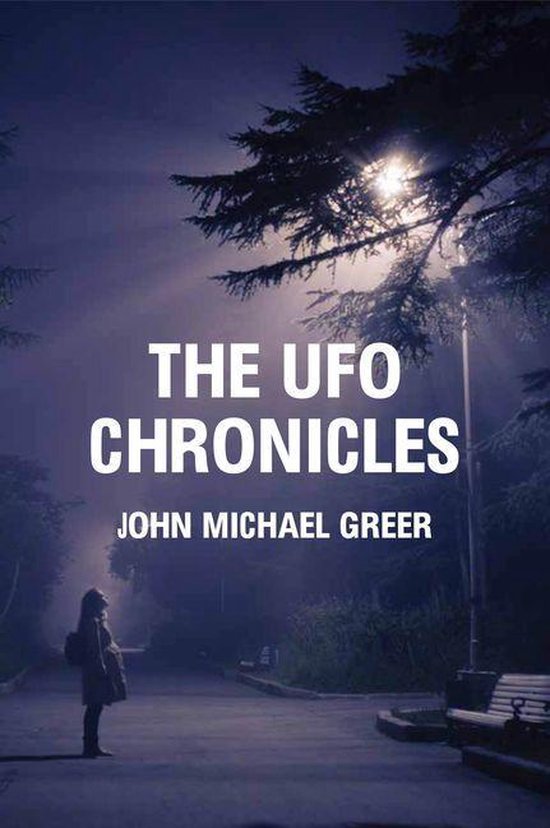UFO’s ontsluierd?
In de nieuwe uitgave van ParaVisie Magazine een artikel over The UFO Chronicles, het spraakmakende boek van de occultist John Michael Greer, waarin hij de bronnen achter het ufofenomeen identificeert. Over dat boek hadden we na lezing wat vragen. We legden ze John via de mail voor. Hieronder zowel de vragen als zijn antwoorden in het oorspronkelijke Engels.
- UFOlogy (and the UFO) seems to share the same fate as parapsychology (and the ghost) in that it has, in spite of mainstream popularity (Hollywood et cetera), never gained and possibly will never gain respect from mainstream science and remains lurking at the borderlands. ‘UFOs are liminal and anti-structural, they are found betwixt and between the heavens and the earth’, as George P. Hansen writes in The trickster and the paranormal. What does it’s marginality say about the phenomenon itself and about us?
JMG: “Every human social creation—and science is such a creation—is defined by what it excludes. Science is no exception. Once something is defined as “unscientific” it fills an essential role in science as a social phenomenon, providing a boundary scientists can use for self-definition. John McClenon’s book Deviant Science: The Case of Parapsychology is essential reading in this context, for parapsychology is used by scientists in the same way, as an Other against which they can define themselves.”
- What is your opinion about the recent openness of the military regarding UFO-sightings? Do you think times are changing or are they once again ‘fooling around’ as they have been doing for decades now (been reading, apart from your book, Saucers, Spooks and Kooksby Adam Gorightly)?
JMG: “Whenever the military starts promoting UFO sightings—and I’d argue that that’s a better description of the recent shenanigans than “openness”—my working guess is that they’re testing another secret aerospace technology and want to raise a smokescreen of deception to make it a little harder for anyone to find out about it. The comparable case is the “black triangles” that showed up, not coincidentally, while the Air Force was testing the first, hypersecret stealth planes.”
- The apparitions… Aren’t they an unknown to explain away another unknown? Is this any better than what proponents of the EXH do when explaining away an unknown (the observation) by another unknown (a spacecraft from another world)? Where’s the proof anything about apparitions you describe actually does work/or can work that way? Why do we need apparitions anyway when it is more than obvious that internal conditioning can color outside stimuli to a very high degree?
JMG: “The advantage of using apparitions as a conceptual category is that a great deal of work has been done on them, mostly but not entirely back a century and more ago in the era of ‘psychical research.’ Apparitions or phantasms, as they were also called, got plenty of close scientific attention in those days, so I’m not explaining one unknown by another: I’m proposing that one set of puzzling experiences can be given additional context and clarity (not “explained”) by comparing them with another, similar set of puzzling experiences that are very well documented.”
- Can the magic influence of occultists have gone further than coloring the observed phenomenon into something exotic (i.e. a spaceship)? Can they perhaps create thought-fields with a life of their own (like tulpas et cetera)?
JMG: “Potentially, yes, but I didn’t want to have to drag the question of objective results of magic into the discussion. That would take a couple of chapters of further evidence and distract from the main issues covered in my book.”
- By taking abductions into your narrative & theorizing, haven’t you fallen into the same trap/pitfall as the ufologist did when observations and sightings of UFOs plummeted and they were looking for another subject to chew on? I mean, these two – sightings of strange things in the sky and supposed abductions – are linked by popular culture and not by fact, right?
JMG: “The only reason I put them in, along with crop circles, cattle mutilation, and several other unrelated things that have gotten scooped up with UFOs in the popular imagination, is precisely that they’ve been scooped up with UFOs in the popular imagination. Partly it’s a desire to deal with the whole social phenomenon that’s emerged under the label of UFOs, and partly I didn’t want readers to email me in a tizzy, saying, “But what about abductions?””
- I am struggling a little bit because of the apparent contradiction between you first pointing towards the creation and existence of the ‘all prevailing narrative’ and then deconstructing that by showing the enormous differences in sightings of UFOs and aliens… Can you help me out?
JMG: “Where’s the contradiction? The narrative is a unity; the human experiences that have been drawn into it as raw material are not. People are actually seeing things, you know—UFOs are not just a free-floating narrative with no objective basis. Some people are seeing unacknowledged military aerospace tests, some are seeing apparitions, some are seeing whatever odd natural phenomena generates those floating balls of light that hover around areas of geological stress, some are seeing ordinary objects and misperceiving them; the narrative has some influence on how they interpret what they see, but (to return to an example already cited) the people who spotted black triangles didn’t redefine them as silvery disks. They reported black triangles, which they interpreted as an unfamiliar type of alien spacecraft. That’s an example of the contested relationship between the narrative and the experiences.”
- You write that abductees could be the shamans of our times and that by not listening to their stories/insights we are doing ourselves a bad service. How would another/better serving attitude look like?
JMG: “It would have to start with an admission that’s utterly unacceptable to the materialist mindset of our time: the admission that spiritual experiences exist and can pass on useful information, usually in symbolic form. Grant that, and it becomes possible to counsel abductees effectively, help them think of their encounters as visionary experiences, and learn from them by interpreting them. Oh, and it would also have to accept the fact that psychic phenomena, elusive and transient as they often are, are an enduring human reality in every culture, and can be an important resource for certain kinds of psychosomatic healing.”
- Romans had their satyrs and fauns, people from the Middle Ages had their incubi/succubi (demons) and the pre-industrial world had its elves and nature spirits. We had our aliens. Now that the UFO/alien narrative is dying out, what could be next?
JMG: “Maybe something from underground! We nearly had that anyway, during the era when the UFO phenomenon was being born: Richard Shaver’s Deros, who were sinister underground dwellers, had a huge presence for a while. Maybe the Deros will come back, or some other presence inside the earth.”
- Anything you like to add… (which website, if any, can I refer the readers to?)
 JMG: “Some readers apparently think that my book is saying that UFOs don’t matter. That’s the opposite of what I’m actually saying. They matter a great deal, in many different ways. They just don’t happen to be spaceships from other planets, and so they don’t support the narrative that’s been piled onto them. There are other ways to understand them that are just as interesting, and just as challenging to the conventional wisdom of our time. As for a website, www.ecosophia.net is my weekly blog.”
JMG: “Some readers apparently think that my book is saying that UFOs don’t matter. That’s the opposite of what I’m actually saying. They matter a great deal, in many different ways. They just don’t happen to be spaceships from other planets, and so they don’t support the narrative that’s been piled onto them. There are other ways to understand them that are just as interesting, and just as challenging to the conventional wisdom of our time. As for a website, www.ecosophia.net is my weekly blog.”
